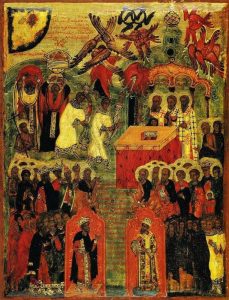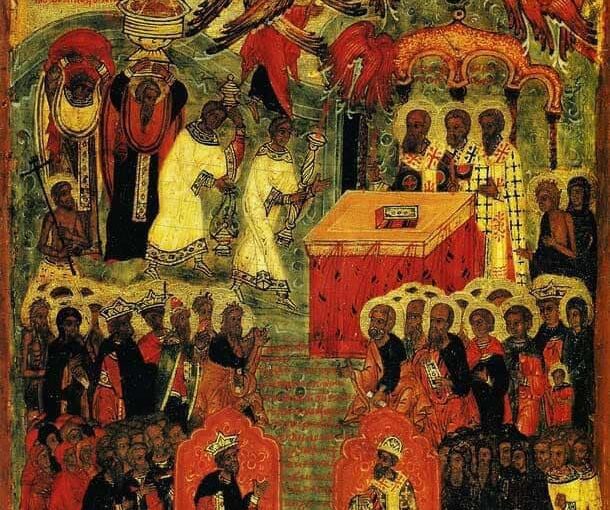 In the liturgy of St John Chrysostom, the Cherubic Hymn (“We who mystically represent the Cherubim”) shows the icon of the angelic ministry of adoration and of prayer in man. It is also the moment where the angelic hosts join the liturgical celebration. Man is associated with their song first in the Trisagion (“Holy God, Holy Mighty, Holy Immortal”) and then the Sanctus resumes the theme of the Anaphora, the eucharistic praise of the Trinity. Men and angels are united in the same élan of adoration (“Holy, Holy, Holy, Lord God of Sabaoth. Heaven and earth are full of Thy Glory”). The content of the age to come, “full of glory,” begins already on earth.
In the liturgy of St John Chrysostom, the Cherubic Hymn (“We who mystically represent the Cherubim”) shows the icon of the angelic ministry of adoration and of prayer in man. It is also the moment where the angelic hosts join the liturgical celebration. Man is associated with their song first in the Trisagion (“Holy God, Holy Mighty, Holy Immortal”) and then the Sanctus resumes the theme of the Anaphora, the eucharistic praise of the Trinity. Men and angels are united in the same élan of adoration (“Holy, Holy, Holy, Lord God of Sabaoth. Heaven and earth are full of Thy Glory”). The content of the age to come, “full of glory,” begins already on earth.
A saint is not a superman, but one who discovers and lives his truth as a liturgical being. The best definition of man comes from the Liturgy: The human being is the one of the Trisagion and of the Sanctus (*I will sing unto the Lord as long as I live”). St Antony speaks of a doctor who gave the poor all that he did not need and sang the Trisagion all day long, uniting himself to the choir of angels. It is for this “action” that man is “set apart,” made holy. To sing to God is his one preoccupation, his unique “labor”: “And there came from the throne a voice that said: ‘Praise God, all you his servants’ ” (Rv 7:11). In the catacombs, the most frequent image is the figure of a woman in prayer, the Orant; she represents the one true attitude of the human soul. It is not enough to say prayers; one must become, be prayer, prayer incarnate. It is not enough to have moments of praise. All of life, each act, every gesture, even the smile of the human face, must become a hymn of adoration, an offering, a prayer. One should offer not what one has, but what one is. This is a favored subject in iconography. It translates the message of the Gospel: chaire, “rejoice and be glad,” “let everything that has breath praise the Lord.” This is the astonishing lightening of the weight of the world, when man’s own heaviness vanishes. “The King of Kings, the Christ is coming, and this is the “one thing needful.” The doxology of the Lord’s Prayer (“the kingdom and the power, and the glory”) is the heart of the liturgy. It is to respond to his vocation as a liturgical being that man is charismatic, the one who bears the gifts of the Spirit, and the Holy Spirit Himself: “You have been sealed with the Holy Spirit … you whom God has taken for His own, to make His glory praised” (Eph 1:14). One could not state more precisely the liturgical essence and destiny of man.
Paul Evdokimov (1901-70)
